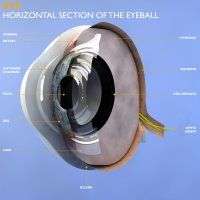Did you know that your eyes are an extension of your brain? There are six muscles connected to each eye, and they receive signals from the brain. These signals direct the eyes movements and, thus, control their ability to focus. When you are stressed, your brain goes through a number of changes and signals
Read more
Vitreous disorders are various conditions that affect the gel-like substance (vitreous) inside the eye that helps the eye keep its round shape. Some of these conditions create only minor vision disturbances while others may be a sign of more serious eye problems. The following are some common vitreous disorders.
Vitreous Detachment
The vitreous has millions of tiny fibers running through it. These attach to the light-sensitive layer of tissue on the back of the eye, the retina.
The vitreous slowly shrinks as you grow older, which causes the fibers to tug on the surface of the retina. This does not usually cause any damage the retina because the fibers break. However, it does allow the vitreous to separate from the retina.
The main symptom of vitreous detachment is floaters in your field of vision. These appear as floating specks or “cobwebs” that dart out of the way when you try to look at them. Sometimes, you may also notice a small but sudden increase in the number of floaters accompanied by flashes of light in your side vision (i.e., peripheral vision).
Other than floaters, vitreous detachment does not usually cause any vision problems. Occasionally, though, when the fibers pull on the retina, they may create a hole in the macula or cause the retina to detach. Both of these can damage your vision and should be treated promptly.
Vitreomacular Adhesion
If the vitreous does not detach completely from the center part of the retina (macula), it can lead to a vitreomacular adhesion. (The macula is needed for sharp center vision.) If the vitreous fibers that are still attached to the macula pull hard enough, they can cause vision changes in the central vision, such as:
- Blurriness
- Decreased vision
- Vision loss in the center (in severe cases)
If you suffer from vitreomacular adhesion, your ophthalmologist may suggest waiting and monitoring the condition to determine whether symptoms get worse. If the symptoms get worse, medication or surgical intervention may become necessary to address the problem.
Uveitis
Uveitis is a type of inflammatory disease that leads to swelling and destruction of the tissues of the eye. This can affect many parts of the eye, including the vitreous, retina, optic nerve, lens and the uvea.
This condition can cause reduced vision or blindness, depending on the part of the eye that is affected. Inflammation of the vitreous, known as intermediate uveitis, has been linked to several other health conditions, such as multiple sclerosis and sarcoidosis.
What to Do If You Think You May Have a Vitreous Disorder
If you experience a sudden change in vision, including an increase in flashes of light in your side vision or in the number of floaters, have your eyes examined by your ophthalmologist right away, as this may be a sign of a serious vision problem.
If you notice gradual changes in your vision or are overdue for your routine eye exam, contact us to schedule an appointment today. Your eye health may depend on it.
-
Stress and Vision
Category: Protecting Your Eyes
-
Pain Management
Category: Protecting Your Eyes
We take a lot of aspects of our vision for granted. We expect to see nearby and faraway objects clearly, even if we require our eye care provider to prescribe eyeglasses or contact lenses to do so. A huge degree of the information we take in about our world and our surroundings takes place visually,
Read more -
Nutrition for Eye Health
Category: Protecting Your Eyes
Eating right is essential for keeping your body healthy. This is as true for your eyes as it is for your heart. A diet that is rich in fresh fruits, vegetables and whole grains, and is low in saturated fat, can reduce your risk of heart disease. This will also keep your arteries healthy, so they can
Read more -
Lifestyle Practices for Eye Health
Category: Protecting Your Eyes
Protecting your eyesight is an important part of staying healthy overall. Maintaining sound eye health will also help you preserve your quality of life as you age. To keep your eyes as healthy as possible, follow these simple lifestyle practices. Get regular eye exams. Some eye problems — including
Read more -
Glare and Halos
Category: Vision Problems
Glare and halos are both eye symptoms that some people experience around bright lights. Halos show up as bright circles around a light source. Glare is light that interferes with your vision, making it difficult to see or sometimes making your eyes water. These symptoms can show up at any time of the
Read more -
UV Radiation and Your Eyes
Category: Protecting Your Eyes
Optometry warnings about the damaging effects of ultraviolet radiation on our eyes have not yet reached the degree of public awareness of that of skin damage. Yet, the sun can be just as damaging upon our eyes with unprotected exposure. Short-term exposure to very bright sunlight can result in a type
Read more -
Lazy Eye
Category: Pediatric Vision
Lazy eye, also referred to as amblyopia, is a condition that develops in infancy or early childhood, and it typically starts when the focus in one eye is more enhanced than the other. The eye with less focus might be impaired due to a significant amount of farsightedness or astigmatism, or something
Read more -
Pediatric Ophthalmology
Category: Pediatric Vision
Ophthalmology addresses the physiology, anatomy and diseases of the eyes. Pediatric ophthalmology focuses on the eyes of children. Pediatric ophthalmologists examine children’s eyes to see if they need corrective lenses or other treatments to improve their vision. Training for Pediatric Ophthalmologists Pediatric
Read more -
September Newsletter: Can Contact Lenses Protect Your Eyes from UV Rays?
Category: Newsletters
-
September Newsletter: How Your Environment Affects Your Eyewear Choice
Category: Newsletters
-
August Newsletter: What Is Swimmer's Eye and How Can It Be Prevented?
Category: Newsletters
-
August Newsletter: The Benefits of Scleral Contact Lenses
Category: Newsletters
-
July Newsletter: Can Eye Exams Detect Diabetes?
Category: Newsletters
-
July Newsletter: Soft vs. Hard Contacts: Pros and Cons
Category: Newsletters
-
June Newsletter: The Importance of Eye Exams for Kids
Category: Newsletters
-
June Newsletter: Can Colored Contacts Help with Vision?
Category: Newsletters
Do you suffer from glare, eyestrain or color blindness? Wearing special contact lenses could help.
Read more
